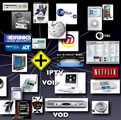 Just like the hardware has to improve in order to bring us the types of service we expect of the Internet in the New Media age, the software upon which it runs will need to evolve. Linux has been one of the better evolutionary steps so far, in the critical area of Web servers, just as open-source and freely distributed Web browsers such as Firefox have spurred innovation. In truth, the entire open-source software revolution did not happen a moment too soon.
Just like the hardware has to improve in order to bring us the types of service we expect of the Internet in the New Media age, the software upon which it runs will need to evolve. Linux has been one of the better evolutionary steps so far, in the critical area of Web servers, just as open-source and freely distributed Web browsers such as Firefox have spurred innovation. In truth, the entire open-source software revolution did not happen a moment too soon.
I am not always totally happy with open-source offerings, just as I am not always happy with the offerings of commercial software companies. Nonetheless, it is difficult to be less than impressed with the spirit in which open-source projects are carried out. An analogy with college and professional football is not without merit, although in the case of software, where the “college player” is usually several years past amateur status, calls into serious question who will win the game when the teams go head-to-head.
It is also beyond doubt that the tools have changed for the better. I started coding in mainframe IBM Assembler, run via punch cards. There was a bad patch shortly after that with COBOL (that very name makes me shiver) but things improved rapidly after that. Pascal and C, followed by C++, were programming languages in which a programmer could be truly elegant, or if necessary could hack together something quick and imaginative over a long weekend. I’ve done a fair amount of both, and either are infinitely better than an hour working with COBOL on a VAX.
Even more impressive, all of this has happened in a very short time. We went from COBOL and FORTRAN to C in 25 years. In the next ten, we went from C to Java and C++, and we’re still going. I’m really starting to like PHP. For all of you that are bored with this line of discussion, the geeks among us are truly impressed with so much progress in so short a time, and with the astonishingly rapid improvement in the tools that are available to us
On a slightly less geeky note, the Web has only been with us for slightly over 15 years. There are very few people in industrialized nations that can now imagine life without the Internet and the World Wide Web. Those two developments have changed our lives more dramatically than any other inventions, ever, with the possible exception of the introduction of agriculture and the Industrial Revolution. I am fairly sure that I can make a case for it being more potent than either of those two foundations of modern society, and I can guarantee that fifteen years is the blink of an eye for a major societal change.
I have spoken of the need for a new economics to go along with this revolution in communication and commerce, and I am very serious about that. The concepts of ownership and intellectual property rights are changing before our very eyes, with ramifications that we cannot yet imagine. The way that we get paid, and for what we get paid, are likely to change drastically over the next 10-20 years, as if they have not already been altered enough already. The distribution of simple commodities like music and art are evolving almost more quickly than we can watch.
None of this will happen without a certain amount of social upheaval. Some of the global unrest that we are seeing today is the result of technology. Where access to technology is limited or contested, there is significant strife. Where the wielders of 19th and 20th century power are trying to monopolize power over information, they are being fought tooth and nail. A lot of people correctly see freedom in some of the aspects of technology, and they are not going to yield it easily, if at all.
Technology, used properly, may at last bring some power to the common man.
